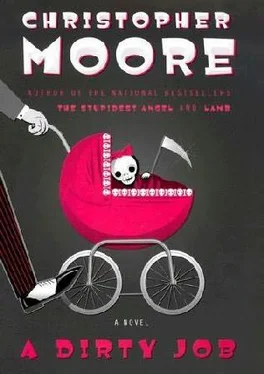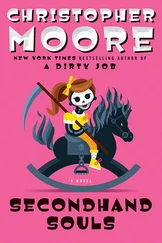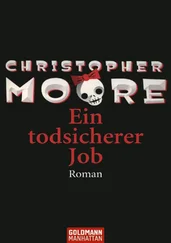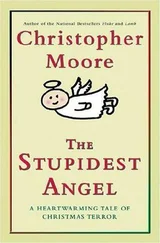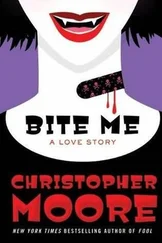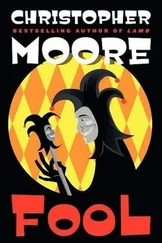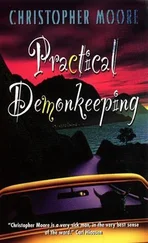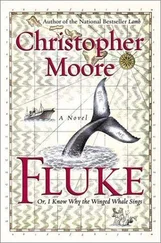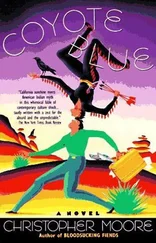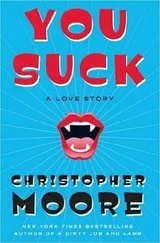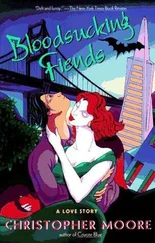“You’d think she’d give up the smoking, with her mother upstairs dying of cancer,” said one of the ladies, wearing a gray skirt and jacket with matching hat, and a large enameled pin in the shape of a Holstein cow.
“Well, she always was a hardheaded girl,” said another, wearing a dress that looked as if it had been made from the same floral material as the couch. “You know she used to meet with my son Jimmy up in Pioneer Park when they were little.”
“She said she was going to marry him,” said another woman, who looked like a sister of the first.
The ladies laughed, whimsy and sadness mixed in their tones.
“Well, I don’t know what she was thinking, he’s as flighty as can be,” said Mom.
“Yeah, and brain damaged,” added the sister.
“Well, yes, he is now.”
“Since the car ran over him,” said Sis.
“Didn’t he run right in front of a car?” asked one of the ladies who had been silent until now.
“No, he ran right into it,” said Mom. “He was on the drugs then.” She sighed. “I always said I had one of each—a boy, a girl, and a Jimmy.”
They all nodded. This was not the first time this group had done this, Charlie guessed. They were the type that bought sympathy cards in bulk, and every time they heard an ambulance go by they made a note to pick up their black dress from the cleaner’s.
“You know Maddy looked bad,” said the lady in gray.
“Well, she’s dying, sweetheart, that’s what happens.”
“I guess.” Another sigh.
The tinkle of ice in glasses.
They were all nursing neat little cocktails. Charlie guessed they’d been mixed by the younger woman who was outside smoking. He looked around the room for something that was glowing red. There was an oak rolltop desk in the corner that he’d like to get a look in, but that would have to wait until later. He ducked out of the doorway and into the kitchen, where two men in their late thirties, maybe early forties, were sitting at an oak table, playing Scrabble.
“Is Jenny coming back? It’s her turn.”
“She might have gone up to see Mom with one of the ladies. The hospice nurse is letting them go up one at a time.”
“I just wish it was over. I can’t stand this waiting. I have a family I need to get back to. I’m about to crawl out of my fucking skin.”
The older of the two reached across the table and set two tiny blue pills by his brother’s tiles.
“These help.”
“What are they?”
“Time-released morphine.”
“Really?” The younger brother looked alarmed.
“You hardly even feel them, they just sort of take the edge off. Jenny’s been taking them for two weeks.”
“That’s why you guys are taking this so well and I’m a wreck? You guys are stoned on Mom’s pain medication?”
“Yep.”
“I don’t take drugs. Those are drugs. You don’t take drugs.”
The older brother sat back in his chair. “Pain medication, Bill. What are you feeling?”
“No, I’m not taking Mom’s pain meds.”
“Suit yourself.”
“What if she needs them?”
“There’s enough morphine in that room to bring down a Kodiak bear, and if she needs more, then hospice will bring more.”
Charlie wanted to shake the younger brother and yell, Take the drugs, you idiot . Maybe it was the benefit of experience. Having now seen this situation happen again and again, families on deathwatch, out of their minds with grief and exhaustion, friends moving in and out of the house like ghosts, saying good-bye or just covering some sort of base so they could say they had been there, so perhaps they wouldn’t have to die alone themselves. Why was none of this in the books of the dead? Why didn’t the instructions tell him about all the pain and confusion he was going to see?
“I’m going to go find Jenny,” said the older brother, “see if she wants to get something to eat. We can finish the game later if you want.”
“That’s okay, I was losing anyway.” The younger brother gathered up the tiles and put the board away. “I’m going to go upstairs and see if I can catch a nap, tonight’s my night watching Mom.”
The older brother walked out and Charlie watched the younger brother drop the blue pills into his shirt pocket and leave the kitchen, leaving the Death Dealer to ransack the pantry and the cabinets looking for the soul vessel. But he felt before he even started that it wouldn’t be there. He was going to have to go upstairs.
He really, really hated being around sick people.
Madeline Alby was propped up and tucked into bed with a down comforter up around her neck. She was so slight that her body barely showed under the covers. Charlie guessed that she might weigh seventy or eighty pounds max. Her face was drawn and he could see the outlines of her eye sockets and her jawbone jutting through her skin, which had gone yellow. Charlie guessed liver cancer. One of her friends from downstairs was sitting at her bedside, the hospice-care worker, a big woman in scrubs, sat in a chair across the room, reading. A small dog, a Yorkshire terrier, Charlie thought, was snuggled up between Madeline’s shoulder and her neck, sleeping.
When Charlie stepped into the room, Madeline said, “Hey there, kid.”
He froze in his steps. She was looking right at him—crystal-blue eyes, and a smile. Had the floor squeaked? Had he bumped something?
“What are you doing there, kid?” She giggled.
“Who do you see, Maddy?” asked the friend. She followed Madeline’s gaze but looked right through Charlie.
“A kid over there.”
“Okay, Maddy. Do you want some water?” The friend reached for a child’s sippy cup with a built-in straw from the nightstand.
“No. Tell that kid to come in here, though. Come in here, kid.” Madeline worked her arms out of the covers and started moving her hands in sewing motions, like she was embroidering a tapestry in the air before her.
“Well, I’d better go,” said the friend. “Let you get some rest.” The friend glanced at the hospice woman, who looked over her reading glasses and smiled with her eyes. The only expert in the house, giving permission.
The friend stood and kissed Madeline Alby on the forehead. Madeline stopped sewing for a second, closed her eyes, and leaned into the kiss, like a young girl. Her friend squeezed her hand and said, “Good-bye, Maddy.”
Charlie stepped aside and let the woman pass. He watched her shoulders heave with a sob as she went through the door.
“Hey, kid,” Madeline said. “Come over here and sit down.” She paused in her sewing long enough to look Charlie in the eye, which freaked him out more than a little. He glanced at the hospice worker, who glanced up from her book, then went back to reading. Charlie pointed to himself.
“Yeah, you,” Madeline said.
Charlie was going into a panic. She could see him, but the hospice nurse could not, or so it seemed.
An alarm beeped on the nurse’s watch and Madeline picked up the little dog and held it to her ear. “Hello? Hi, how are you?” She looked up at Charlie. “It’s my oldest daughter.” The little dog looked at Charlie, too, with a distinct “save me” look in its eyes.
“Time for some medicine, Madeline,” the nurse said.
“Can’t you see I’m on the phone, Sally,” Madeline said. “Hang on a second.”
“Okay, I’ll wait,” the nurse said. She picked up a brown bottle with an eyedropper in it, filled the dropper, and checked the dosage and held.
“Bye. Love you, too,” Madeline said. She held the tiny dog out to Charlie. “Hang that up, would you?” The nurse snatched the dog out of the air and set it down on the bed next to Madeline.
“Open up, Madeline,” the nurse said. Madeline opened wide and the nurse squirted the eyedropper into the old woman’s mouth.
Читать дальше
